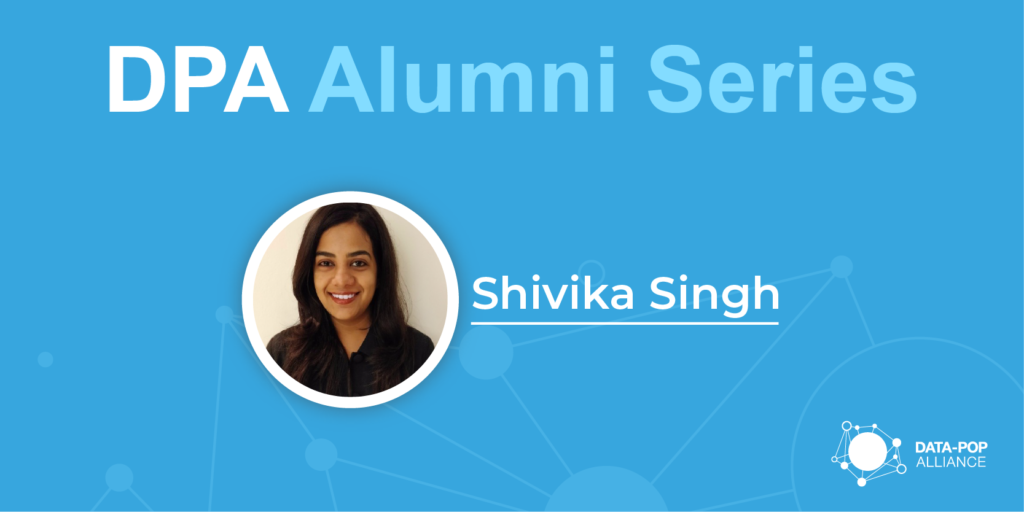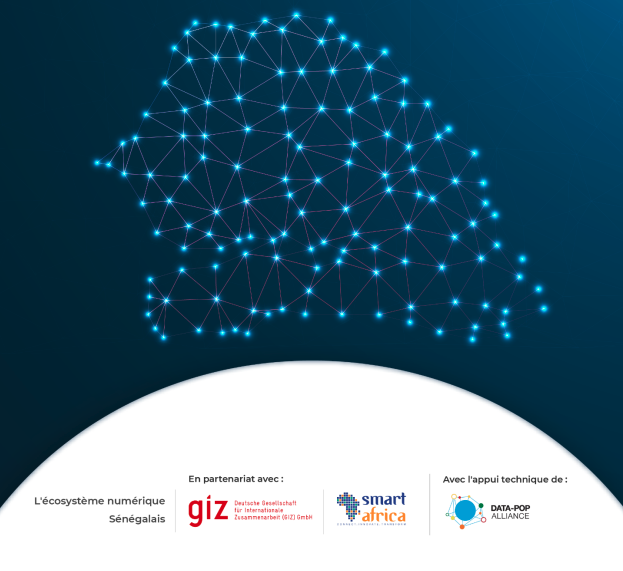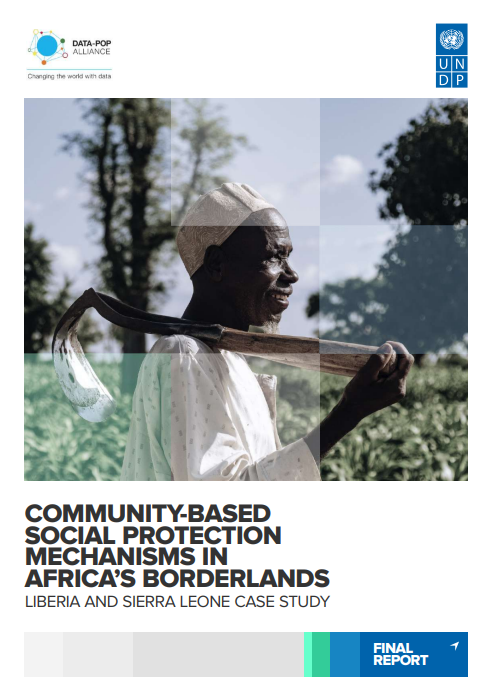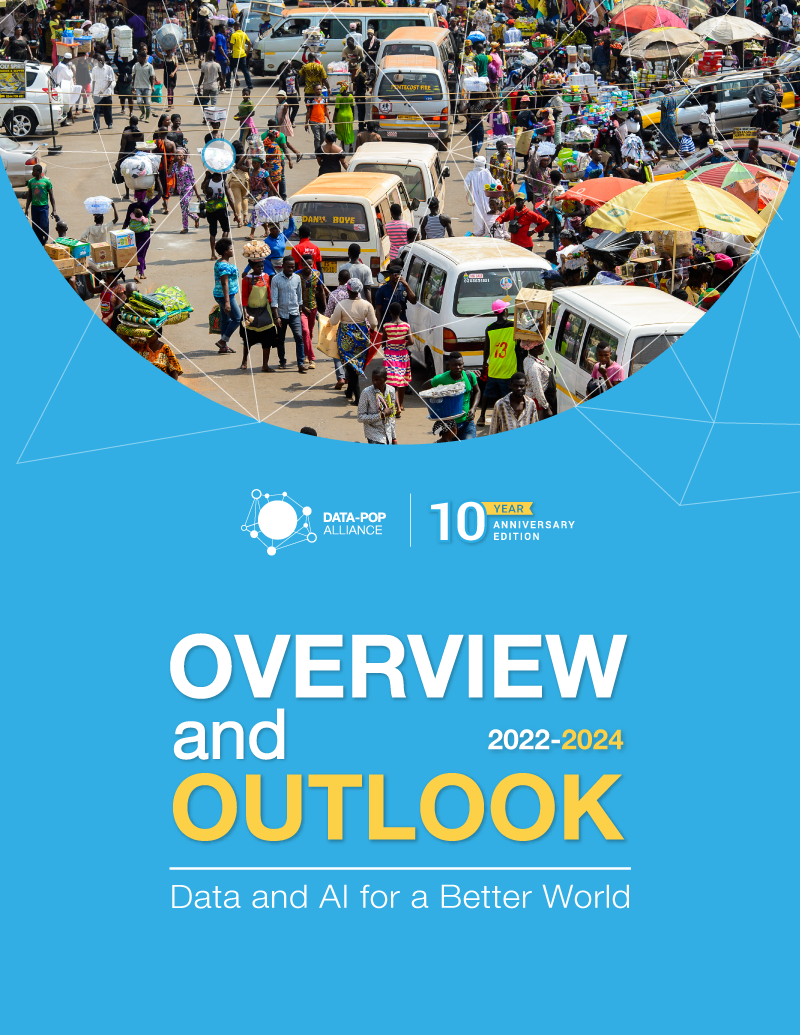DPA Alumni Series Interview: Shivika Singh

In the “Alumni Series”, we catch up with former Data-Pop Alliance interns to hear about their experiences working with DPA, what they learned, and how it helped them on their career paths. The first edition features Managing Director Natalie Grover (NG) interviewing former Intern Shivika Singh (SS), who worked with DPA in 2018.
NG: Can you just give us a quick introduction. Tell us a bit about who you are, when you worked with DPA, what you did during your time with us, and what you do now?
SS: Sure, I joined DPA as an intern while I was doing my Master’s in Economics at Columbia, and my internship initially started as project management for DPA’s effort to increase collaboration and build up a platform for training. I was also working on some cool research projects during my time there. Once I graduated, I joined Microsoft as a Data and AI Consultant, and a lot of the AI and big data work was inspired by the internship, even though Microsoft was a different, more tech-related company. About two months ago, I started a new position as a Business and Development Lead in Regional Strategy for TikTok in Europe.
NG: I’d like to talk about the platform you worked on, and know whether you remember the research topics you got a chance to work on during your time with DPA?
SS: We had gone to Harvard Humanitarian Initiative (so my internship was partially in New York and partially in Boston). At the time we were doing a white paper on one of the initiatives they were working on for an upcoming UN conference, and that’s something I was helping with. It was about how big data could be applied to issues like policy or the environment. I was also looking into the call data records for Colombia, which could be used to track movements and determine crime hotspots. I still remember that was super cool to me.
NG: Actually, that is something that is still in progress, and we are just about to publish one of the outputs from that project. You were part of something that was really cutting-edge at the time, it’s called “Ciudad Segura”, if you want to look it up and see the progress.
I’m curious if you could walk me through your impression of the development world when you joined DPA, had you considered working in this sector before? I’m interested because you have experience in all three of these areas, public sector/civil society, NGOs and then also private sector.
SS: To be honest, that was the initial goal. [Before joining DPA] I was working as an Economic Policy Consultant for the Government of India. I did work in the private sector right out of undergrad at Goldman Sachs, but then I moved to the public sector, where my projects were on social policy, such as rainwater harvesting and air pollution; very development-related projects. When I was at Columbia, I wanted to stay within the sector and do more data-driven work. It was really an eye-opener outside of India to see what data was being used for in the development sector as compared to India, which was one of the main driving forces behind the internship itself. The move to the private sector had more to do with other opportunities that presented themselves.
NG: When you think about DPA as a place to work, can you remember your impression of the organizational culture, and anything that stood out in that regard?
SS: Mine [experience] was phenomenal, I really liked it. I remember when I first got it, it was my first job in the US, so I was nervous about the role, but I had asked for flexibility from Julie (Ricard) and the team, because I had also gotten a teaching position at Columbia to teach high school students. They said, “Sure, of course, we’ll make it work, let’s figure it out”.
During the internship, I had the chance to go many places as well. When Julie would go to Harvard or HHI (Harvard Humanitarian Initiative) meetings, we used to participate in them 100%, and go and see the projects [HHI was working on at the time]. Also, if you wanted to say something, you had the freedom to ask questions. It’s a really awesome culture, people help and guide, and if you want to do something more, [the opportunity] it’s always there.
NG: I’m wondering if there were any skills in particular, even soft skills, that you gained and helped you later on with different jobs you have taken?
SS: I think the main skill that I learned was generally touching upon the scope of big data, in the sense that you may know “theoretically” what it is, but because I was literally building a training model, I found myself answering these questions about what big data is and its applications. Apart from that, I think my second biggest thing was that it was such an eye-opening experience to understand how data influences so much of the social sector. For example, data points were used during the refugee crisis to track movements and hotspots, which is amazing. I also improved my skills in general research, as well as on the strategy behind it, especially for cutting-edge topics, which is something that I still use today.
"It was such an eye-opening experience to understand how data influences so much of the social sector. For example, data points were used during the refugee crisis to track movements and hotspots, which is amazing."
Shivika Singh- Developer
NG: The next thing I want to ask is maybe the flip side of this, is there anything you wish you had been able to do in the internship, or something you can remember that could have improved our internship program?
SS: I honestly don’t know what has changed since then, but I think I would have enjoyed doing even more research. Because it’s my interest area, I would have liked a heavier research component.
NG: You mentioned working with Julie, but I wonder if you remember working with other members of the organization, particularly Emmanuel (Letouze, DPA Founder/Director), and if you feel like you had a good sense of what DPA was all about, what our background was, and why we do the work we do?
SS: He [Emmanuel] was actually the first person I reached out to, so he was my main point of contact at first, before Julie took over. He gave me an overview of what DPA does and the pillars; I remember him walking me through the entire website, and getting great insights from someone who practically runs the organization. I also had a chance to meet Sandy Pentland (DPA Academic Director) a couple of times at MIT, and he was amazing. I don’t think he even knew who I was and he took the time to sit down and talk with Julie and I about big data. I think people there just like to share knowledge and the overall insights came from a lot of people, including the leadership team.
NG: Excellent, so I was also wondering what kind of advice you give to someone who is looking at internships, and maybe they don’t know what they want to do but have an interest in development, what would you tell them about finding the right internship?
SS: When I mentor or talk to students about what kind of internship they should do, it’s generally driven by what you want to do after the internship. If you’re looking to explore, one of the best ways to do that is through internships, because you can take a bit of risk and explore a different career path. Also, for those who want to eventually get a PhD, a research internship is super helpful.
NG: That’s great. My last question is, looking back with your 20/20 hindsight, if you could advise yourself in the past about how to best take advantage of your time as a DPA intern, what would you say?
SS: I would say go into it with as open a mind as possible. It’s a very interactive team, and they like pushing you forward rather than pulling you down, so if you need something or want to know something, just ask. This goes for if you want to engage in a research-focused internship or do something different as well. [DPA] It’s a great place to learn, so don’t shy away from asking.
"It’s a very interactive team, and they like pushing you forward rather than pulling you down, so if you need something or want to know something, just ask."
Shivika Singh- Developer



